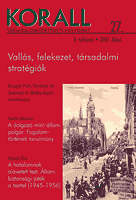A dolgozó mint állampolgár. Fogalomtörténeti tanulmány a magyar szocializmus három korszakaszáról
The worker as citizen. Historical concept analysis of the three periods of Hungarian socialism
Author(s): Márton SzabóSubject(s): History
Published by: KORALL Társadalomtörténeti Egyesület
Summary/Abstract: This study is an historical concept analysis that investigates how a new subject of political rights and a new community of politics were constructed through political debates in the three historical periods of Hungarian socialism. The central character of this construction was the socialist/communist worker, who was interpreted from the point of view of work, however, he was not a character of production but that of politics: he was the new citizen. The meaning of the concept changed through time. In 1919, during the period of the Hungarian Soviet Republic, the worker was an unselfi sh person who supported the regime in all aspects of life. In the years of personality cult, he was a top-worker, whose deeds were set by the regime as examples to be followed. In the years of János Kádár’s rule, he was an empty and formalised character in politics, who was expected to support the regime but was understood to have personal points of view as well. In the subsequent phases the socialist worker became a more articulated and diff erentiated concept, and in the end its opposite also became a legitimate member of society. This study presents the complex structure of the meanings of the communist worker as well as its political usage as a counter-concept and an identity-concept. It concludes that political acts in socialism can be interpreted primarily not through power institutions but rather through that elaborate character of the age: the worker.
Journal: Korall - Társadalomtörténeti folyóirat
- Issue Year: 2007
- Issue No: 27
- Page Range: 151-171
- Page Count: 21
- Language: Hungarian

